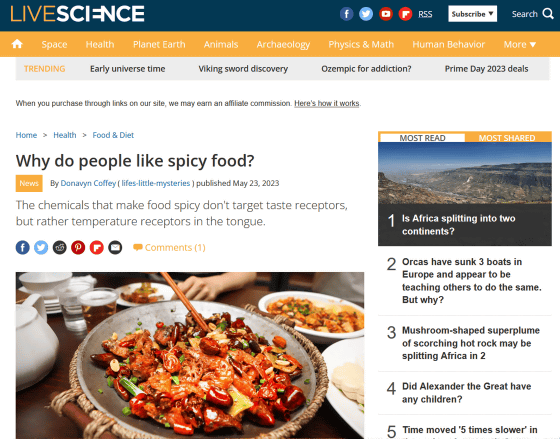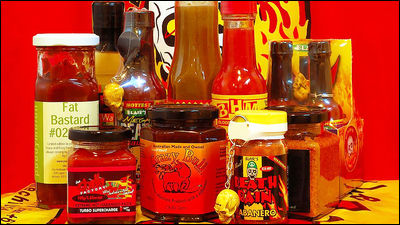Why do people like spicy food?

The 'spiciness' that you feel when you eat chili peppers is actually the same as 'pain', unlike the sourness, bitterness, sweetness, saltiness, and umami that you can feel with your sense of taste. Live Science, a scientific media, summarizes why people love ``spiciness'', which should be the same as pain.
Why do people like spicy food? | Live Science

The tongue has not only receptors that perceive taste, but also receptors that perceive temperature, etc. When you eat a dish that uses hot ingredients such as hot peppers, the thermoreceptors react, not the taste receptors. It's painful,' he said. The chemical substance that causes the pungent taste contained in peppers and the like is called capsaicin , and it is believed that it developed as a secondary metabolite to prevent plants from being eaten by predators.
Capsaicin binds to a receptor called ' TRPV1 ', which is responsible for detecting body temperature and usually responds to temperatures above 40 degrees Celsius. However, when you eat 'spicy food' containing capsaicin, the capsaicin molecule binds to TRPV1 and reduces its activity, allowing it to react even at a temperature of about 33 degrees Celsius, which normally does not react. Since the temperature in the mouth exceeds 35 degrees Celsius, eating capsaicin makes the inside of the mouth feel hot.
Not only capsaicin but also piperine contained in pepper and highly acidic vinegar react to TRPV1. On the other hand, chemical substances contained in allicin contained in garlic and wasabi etc. bind to another thermoreceptor called TRPA1 .
``Humans are the only animals that really enjoy this burning sensation,'' said John Hayes, a professor of food science at Pennsylvania State University. He points out that he doesn't like to eat.

There are several hypotheses about the question 'Why do some people like spicy food?' There is a theory that.
A 2016
It is unclear how risks such as danger and pain are linked to rewards in the brain, but one researcher described the appeal of spicy food with terms such as 'limited risk' and 'benign masochism'. says Live Science. No matter how much spicy food you eat, you rarely die, so you can experience risk without affecting your life.

Also, how much spicy food you eat can be influenced by the social group and culture to which you belong. A 2015 study of people living in Pennsylvania showed that men were more likely than women to eat spicy food due to outside influences and social motivations.
Others say, 'In hot climates, sweating can cool the body, so people prefer spicy food that induces sweating.' There is a theory that if you have it, you like spicy food.' 'It's probably a combination of all these factors,' said Alyssa Norden, a food scientist at the University of Massachusetts, about her preference for spicy food.
Related Posts:







